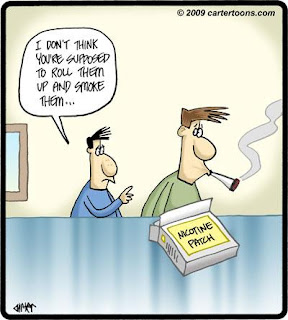Wednesday, December 30, 2009
Happy (Non Smoking) New Year ~
Monday, December 28, 2009
A Holiday Letter ~

Happy Holidays! Happy No Smoking!!!
I read some of your blog today, it is really good! I assume you are not smoking, right?????????????? I think that is fantastic!!!! God bless you for doing the right
thing, one day at a time :) And keeping up with your blog. It is special, and I bet
it helps more people than you will ever know...
Me, still not smoking, one day at a time. If I can do it, anyone can do it. I know a lady who struggles, I think I will give her your blog, see if she can get some help.
Hope all is well with you. Sorry I did not write sooner. I think I wrote enough for a year! It was good for me, helps me remember what I used to be like, and what
I have to do to not go back there :)
Love,
Vickie
Thursday, December 24, 2009
~ Merry Christmas ~
~FJW~
Tuesday, December 22, 2009
Sunday, December 20, 2009
Just 15 Cigarettes May Alter DNA
 By Liz Neporent from AOL Health
By Liz Neporent from AOL HealthThink puffing on a cigarette every now and then wont hurt you? Think again. New research suggests that smoking just 15 cigarettes damages your DNA.
The large new study led by researchers from the Cancer Genome Project at the Wellcome Trust Sanger Institute in Britain identified more than 20,000 genetic mutations caused by tobacco toxins. This translates into roughly one mutation for every 15 cigarettes smoked, with each mutation ravaging the genetic code held within the DNA. Sometimes the bodys cells are able to make repairs and fend off cancer but often its a losing battle: When mutations grab hold of key genes, it leads to cancer.
"The profile of mutations we observed is exactly that expected from tobacco, suggesting that the majority of the 23,000 we found are caused by the cocktail of chemicals found in cigarettes, notes Peter Campbell, senior author of the work.
All cancers are the result of mutations, or mistakes in the genetic code, and frequently theyre caused by environmental factors such as tobacco toxins. In fact, smoking is considered the leading cause of preventable diseases. In this instance, no single mutation stood out as the lung cancer gene. Mutations ranged from simple swaps of a few letters in the genetic code to complex rearrangements of many thousands of letters. Most were a type known as passenger mutations that only appear to cause cancer when merged with other mutations.
The study was so comprehensive that the team could see signatures of an undiscovered system of DNA repair, reducing the mutations in highly active genes, suggesting the genome seeks to preserve these regions and sacrifice others. But the damage done by lighting up is passed onto every subsequent generation of daughter cells leaving a permanent record of the havoc wrecked. Like an archaeologist, we can begin to reconstruct the history of the cancer clone -- revealing a record of past exposure and accumulated damage in the genome," said Andy Futreal, Ph.D., another one of the investigators.
Still, if you kick the habit, there is a glimmer of hope. The Wellcome trust team suspects that over long periods of time lung cells are able to activate fresh stem cells that can clear away mutations and repair the damage. They say the risk of lung cancer falls to around normal some 15 years after a person quits smoking.
Saturday, December 19, 2009
Tuesday, December 15, 2009
Have You Committed to Your Quit Date?
 It takes courage to put down that last cigarette and quit smoking. Most people feel an intense combination of fear and excitement leading up to their quit date. Feeling afraid to quit smoking is completely normal, and is a by-product of addiction. Don't let that fear paralyze you, however, because the benefits you'll experience once you quit are well worth the work it takes to achieve.
It takes courage to put down that last cigarette and quit smoking. Most people feel an intense combination of fear and excitement leading up to their quit date. Feeling afraid to quit smoking is completely normal, and is a by-product of addiction. Don't let that fear paralyze you, however, because the benefits you'll experience once you quit are well worth the work it takes to achieve.The truth of the matter is......smokers like the feeling they get when the nicotine level in their bloodstream is replenished. From the time a cigarette is stubbed out until the next one is lit, smokers are in a state of physical withdrawal from nicotine. The more time between cigarettes, the more severe the withdrawal, resulting in edginess, inability to concentrate, and even feelings of depression. It's a vicious, never ending cycle. And that's addiction, folks, not smoking enjoyment.
Support is a key ingredient to a solid quit smoking program. Your resolve will be bolstered more than you can imagine just by being around others who have the same goals you do. Visit here often to validated your journey. Remember, quitting tobacco is a process that takes time.
Sunday, December 13, 2009
The Peripheral Cost of Smoking ~
 This weekend I surpassed the $1,000 saved thus far mark.
This weekend I surpassed the $1,000 saved thus far mark.In less than a half a year, that's a lot of jack not going 'up in smoke'.
This is a conservative estimate. It's based off of buying two packs at a time; one 'cheap' generic brand and one premium brand and then smoking 30 cigarettes a day.
What is NOT calculated here is the peripheral cost of smoking. The high cost and frequent use of inhalers. Gum, mints, mouthwash, air-freshener and lighters.
Additional cost savings come from my decreased consumption of coffee, cola and beer. As a smoker I always had dry mouth and would get a scratchy throat if I didn't keep my mouth moist. Water was never enough to mask the left over taste of stale smoke in my mouth. It was always better to have the alcohol or caffeine -- I have seriously decreased the intake of these over the past five months.
None of this takes into account medical and dental costs. Did you know smokers have a higher percentage of root canals than non-smokers? As for me I've had at least Six root canals and crowns, maybe more, I've lost count.
Then there's the colds, cold meds, throat medications and other health issues that us smokers have to deal with.
This all adds up to signifiacant savings -- Something you may want to consider if you are quitting 1/01/10: keep a cigarette money jar and put in daily the price of a pack of smokes then count your jar in six months.
Friday, December 11, 2009
Strategies and Skills for Quitting: Step 5
 Be prepared for relapse ~
Be prepared for relapse ~But don't plan for them -- plan against them!
Most people are not successful the first few times they try to quit smoking. (I've failed many times before but am really enjoying my success now.)
You might try something new next time, such as a new medicine or program or hypnosis like I did the last time. You might try combining tools, such as counseling and medicine. Keep trying, and don't be fooled by light cigarettes, or reducing your smoking. Neither one appears to make smoking safer.
Quitting tobacco use when you have other medical conditions.
If you have depression, anxiety, or similar problems, or if you have had an alcohol or drug use problem, try to care for that problem before you try to stop smoking.
Some people who have had one of these medical problems find that the problem returns when they try to quit smoking. If you have any of these problems, talk to your doctor before you quit.
After you quit, seek help right away if you see signs that the problem is returning.
Smoking can also affect the level of several medicines in your blood. If you take medicines for a health problem, talk with your doctor before you quit smoking to see whether you should alter the dose.
Thursday, December 10, 2009
Strategies and Skills for Quitting: Step 4
 Get and use medication ~
Get and use medication ~I'm a huge proponent of this.
These medications also may help you if you use chewing tobacco, snuff, pipes, or cigars every day.
If you are trying to quit try one or more of these medications. Using medications along with learning new behaviors like exercise further increases your likelihood of success.
Nicotine replacement products include nicotine gum, patches, lozenges, and inhalers. You can buy gum, patches, and lozenges without a prescription.
If you've been reading along for a while you know I am an advocate for Welbutrin -- originally marketed as an anti-depressant but was found to have excellent smoking cessation attributes.
(As an anti-depressant it will also help with then anxiety new non smokers feel).
Your doctor can prescribe something suited for you and explain how to use it. It's very important to take the medicines for a long-enough time. (Probably at least 3 months).
Remember, taking medicines and using counseling or a cessation program at the same time greatly increases your chances of success.
Wednesday, December 9, 2009
Strategies and Skills for Quitting: Step 3
 Learn new skills and behaviors~
Learn new skills and behaviors~Identify and think about ways you can avoid those things that make you reach for a cigarette (Combating Those Nasty Triggers ~ ), or change your smoking habits and rituals. Think about situations in which you will be at greatest risk for smoking. Make a plan for how you will deal with each situation.
Change your daily routine. Take a different route to work or eat a meal in a different place. Every day, do something that you enjoy.
Cut down on stress. Calm yourself or release tension by reading a book, taking a hot bath, or digging in your garden. See the topic Exercise Shown To Powerfully Decrease Cigarette Cravings for ways to reduce stress in your life.
Hang around nonsmokers and people who have stopped smoking.
Tuesday, December 8, 2009
Strategies and Skills for Quitting: Step 2
 Get help ~
Get help ~You will have a better chance of quitting successfully if you have help and support from your doctor, family, friends, and coworkers. Use some of the suggestions from yesterday when you call your MD.
A doctor, nurse, or mental health professional can help you tailor an approach to quitting smoking that best suits your needs. These people are also good sources of motivation and support during the quitting process.
Tell your friends that you are quitting, and talk to ex-smokers about their experiences during and after quitting. Have a friend or ex-smoker check in with you once in a while to ask how you are coping.
If you live with someone who smokes, let that person know how he or she can support you. Be specific. Talk with him or her about not smoking in front of you. Better yet, ask that person to quit smoking with you. That way you can support each other through the quitting process. Also, family and friends can support and encourage you while you are quitting.
Join a support group for people trying to quit smoking. People who have quit smoking may be particularly helpful, because they know what you are going through.
Get counseling (telephone, individual, or group). The more counseling you get, the better your chances of quitting. Counseling may help you learn to recognize and cope with situations that tempt you to smoke. Counseling sessions can also offer comfort if you have a relapse.
You may want to attend a program to help you quit smoking. When choosing a smoking cesation program, look for one that has proven success. Ask your doctor for ideas. You can also check with your local health department or call the national quit line at 1-800-QUITNOW for help.
Use the Internet. The Internet allows round-the-clock access to information about quitting smoking and to chat rooms that can provide support. These programs are good for people who can't get to a stop-smoking meeting. They also work well for people who don't like group meetings.
Monday, December 7, 2009
Strategies and Skills for Quitting: Step 1
 Get ready ~
Get ready ~ Here we are, It's Monday, the start of a new work week and the first full week in the last month of the year. It's a good time to start to prepare to quit smoking and it's never too early for that. So let's 'have at it'.
Saturday, December 5, 2009
~Strategies and Skills for Quitting~
 I have been Smoke Free for Exactly 5 months!
I have been Smoke Free for Exactly 5 months!
If you're envious of my success thus far give this some thought:
In less than one month it will be another New Year ~ Traditionally this has been a time to make resolutions to improve one's life in some way.
One of the most popular New Year's resolution is, of course, to Quit Smoking.
In an effort to help anyone who has a desire to conquer their smoking demon this New Year I am going to dedicate the month of December to the preparations a smoker may want to take prior to quitting.
When you plan a strategy for quitting tobacco, one I like to recommend is the U.S. Surgeon General's five keys to quitting: get ready, get support, learn new skills and behaviors, get and use medicine, and be prepared for relapse.
I will outline each of these steps next week beginning on Monday 12/7 and running through Friday.
I guess it is important to add the disclaimer that I am not a doctor, I've researched this subject, however nothing I write should be intended to replace advice from your own doctor or qualified professional.
(And if you read past post you know I highly recommend the use of prescribed drugs in your quit smoking endeavor).
Stay tuned and I hope to see you Monday... FJW
Wednesday, December 2, 2009
~ My BFF Barb ~
 We’re getting to the age where we don’t just visit the doctor – everything has to be a “procedure”.
We’re getting to the age where we don’t just visit the doctor – everything has to be a “procedure”. I got a call from my best friend in the world this week – Barb from Florida. She was having one of those.
Early in the morning the day of her procedure she started hacking away with her morning ritual -- the smoker’s cough. The anesthesiologist stops things, announces to the OR “we have a smoker” and orders a breathing treatment.
Although aware of the multitude of negative effects smoking causes, Barb was less than aware of the coughing and wheezing she was experiencing on a daily basis. Let’s just call this the denial of an addict.
We’ve all been there – I know I have. I may have been one of the worst. I was taking hits of my inhaler before and after each cigarette. It was just to the point of being ridiculous. I don’t know who, if anyone, has been following me for the past five months but if you have you may remember that “ridiculous” was my word for the month for July.
(~Re-Born on the 4th of July~) “As for my own struggle with this powerful addiction
the one word that keeps coming to mind is ’Ridiculous” … basically, I’ve spent
nearly 30 years killing myself, as my hypnotherapist put it; “on an installment
plan” … which defies all common sense reasoning.”
Once again I am encouraging Barb (and anyone else with a desire to finally become smoke free) to follow along here and hopefully I can inspire her to quit and we can be support for a better life for each other.
There's nobody in this world I love and adore like
Best Friends Forever
Tuesday, December 1, 2009
~ 150 SMOKE FREE DAYS!!! ~
 The struggle, anxiety, discomfort, et al are all starting to pay off.
The struggle, anxiety, discomfort, et al are all starting to pay off. 150 Smoke Free (and cheat free) days and I am still going strong -- in fact, I am stronger than ever.
There still are times I think I might like to have a cigarette, but that is not the same as craving one.
Let's face it, after nearly 30 years addicted to smoking, the constant coveting of the next smoke break is pretty well ingrained in my personality.
This weekend, 12/5/2009 I will be Five Months (22 Weeks) tobacco free. After so many attempts in the past, I am not yet ready to call this my second longest time, but if it's not, it's darn close.
I know my longest time is just under 11 months. I will wait until after the New Year to claim this to be my second longest time.
Of course, my ultimate goal is to make this my last as well as most successful time!
Let me know how you are doing.




